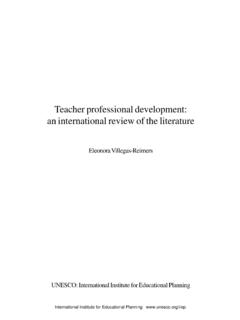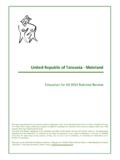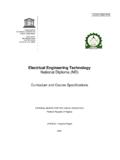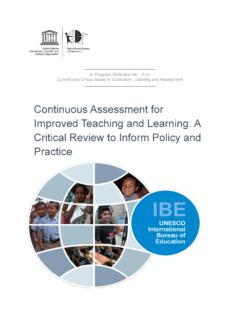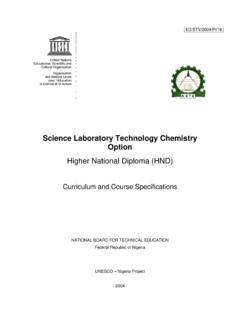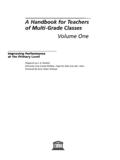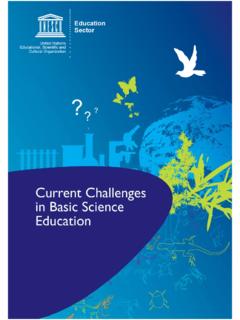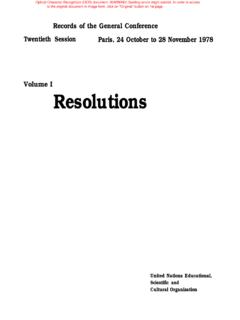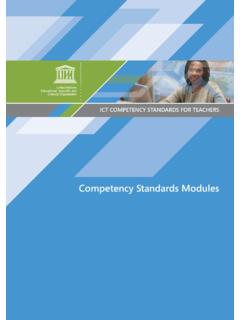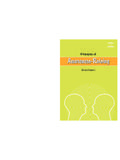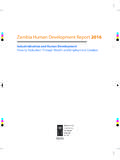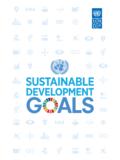Transcription of Education for people and planet - UNESCO
1 CREATING sustainable FUTURES FOR ALL Education for people and planet : SustainableDevelopmentGoalsUnited NationsEducational, Scientific andCultural Organization2016 global Education monitoring REPORTCREATING sustainable FUTURES FOR ALL Education for people and planet : 2016 global Education monitoring REPORTUNESCO PublishingSustainableDevelopmentGoalsUni ted NationsEducational, Scientific andCultural OrganizationThis report is an independent publication commissioned by UNESCO on behalf of the international community. It is the product of a collaborative effort involving members of the report team and many other people , agencies, institutions and designations employed and the presentation of the material in this publication do not imply the expression of any opinion whatsoever on the part of UNESCO concerning the legal status of any country, territory, city or area, or of its authorities, or concerning the delimitation of its frontiers or global Education monitoring report team is responsible for the choice and the presentation of the facts contained in this book and for the opinions expressed therein, which are not necessarily those of UNESCO and do not commit the Organization.
2 Overall responsibility for the views and opinions expressed in the report is taken by its Director. UNESCO , 2016 Second edition Published in 2016 by the United Nations Educational, Scientific and Cultural Organization 7, Place de Fontenoy, 75352 Paris 07 SP, France Graphic design by FHI 360 Layout by FHI 360 Cover and back cover photos: Fadil Aziz/Alcibbum PhotographyThe cover photos are of school children from the Palau Papan Island in the archipelago of Togean in Sulawesi, Indonesia. The children, from the Bajo tribe, live in stilt houses and cross a bridge spanning kilometres to the neighbouring island of Melange to go to school every by UNESCO ISBN: 978-92-3-100167-3 This publication is available in Open Access under the Attribution-ShareAlike IGO (CC-BY-SA IGO) license ( ).
3 By using the content of this publication, the users accept to be bound by the terms of use of the UNESCO Open Access Repository ( ).The present license applies exclusively to the text content of the publication. For the use of any material not clearly identified as belonging to UNESCO , prior permission shall be requested from: or UNESCO Publishing, 7, place de Fontenoy, 75352 Paris 07 SP global Education monitoring REPORTiForeword In May 2015, the World Education Forum in Incheon (Republic of Korea), brought together 1,600 participants from 160 countries with a single goal in mind: how to ensure inclusive and equitable quality Education and lifelong learning for all by 2030? The Incheon Declaration for Education 2030 has been instrumental to shape the sustainable development Goal on Education to Ensure inclusive and equitable quality Education and promote lifelong learning opportunities for all.
4 It entrusts UNESCO with the leadership, coordination and monitoring of the Education 2030 agenda. It also calls upon the global Education monitoring (GEM) report to provide independent monitoring and reporting of the sustainable development Goal on Education (SDG 4), and on Education in the other SDGs, for the next fifteen years. The ultimate goal of this agenda is to leave no one behind. This calls for robust data and sound monitoring . The 2016 edition of the GEM report provides valuable insight for governments and policy makers to monitor and accelerate progress towards SDG 4, building on the indicators and targets we have, with equity and inclusion as measures of overall success. This report makes three messages starkly clear. Firstly, the urgent need for new approaches. On current trends only 70% of children in low income countries will complete primary school in 2030, a goal that should have been achieved in 2015.
5 We need the political will, the policies, the innovation and the resources to buck this , if we are serious about SDG4, we must act with a sense of heightened urgency, and with long-term commitment. Failure to do so will not only adversely affect Education but will hamper progress towards each and every development goal: poverty reduction, hunger eradication, improved health, gender equality and women s empowerment, sustainable production and consumption, resilient cities, and more equal and inclusive societies. Lastly, we must fundamentally change the way we think about Education and its role in human well-being and global development . Now, more than ever, Education has a responsibility to foster the right type of skills, attitudes and behavior that will lead to sustainable and inclusive growth.
6 The 2030 Agenda for sustainable development calls on us to develop holistic and integrated responses to the many social, economic and environmental challenges we face. This means reaching out beyond traditional boundaries and creating effective, cross-sectoral partnerships. A sustainable future for all is about human dignity, social inclusion and environmental protection. It is a future where economic growth does not exacerbate inequalities but builds prosperity for all; where urban areas and labour markets are designed to empower everyone and economic activities, communal and corporate, are green-oriented. sustainable development is a belief that human development cannot happen without a healthy planet . Embarking upon the new SDG agenda requires all of us to reflect upon the ultimate purpose of learning throughout life.
7 Because, if done right, Education has the power like none else to nurture empowered, reflective, engaged and skilled citizens who can chart the way towards a safer, greener and fairer planet for all. This new report provides relevant evidence to enrich these discussions and craft the policies needed to make it a reality for Bokova Director-General of UNESCOiiForeword The 2016 global Education monitoring report (GEM report ) is both masterful and disquieting. This is a big report : comprehensive, in-depth and perspicacious. It is also an unnerving report . It establishes that Education is at the heart of sustainable development and the sustainable development Goals (SDGs), yet it also makes clear just how far away we are from achieving the SDGs. This report should set off alarm bells around the world and lead to a historic scale-up of actions to achieve SDG GEM report provides an authoritative account of how Education is the most vital input for every dimension of sustainable development .
8 Better Education leads to greater prosperity, improved agriculture, better health outcomes, less violence, more gender equality, higher social capital and an improved natural environment. Education is key to helping people around the world understand why sustainable development is such a vital concept for our common future. Education gives us the key tools economic, social, technological, even ethical to take on the SDGs and to achieve them. These facts are spelled out in exquisite and unusual detail throughout the report . There is a wealth of information to be mined in the tables, graphs and the report also emphasizes the remarkable gaps between where the world stands today on Education and where it has promised to arrive as of 2030. The gaps in educational attainment between rich and poor, within and between countries, are simply appalling.
9 In many poor countries, poor children face nearly insurmountable obstacles under current conditions. They lack books at home; have no opportunity for pre-primary school; and enter facilities without electricity, water, hygiene, qualified teachers, textbooks and the other appurtenances of a basic Education , much less a quality Education . The implications are staggering. While SDG 4 calls for universal completion of upper secondary Education by 2030, the current completion rate in low-income countries is a meagre 14% (Table ).The GEM report undertakes an important exercise to determine how many countries will reach the 2030 target on the current trajectory, or even on a path that matches the fastest improving country in the region. The answer is sobering: We need unprecedented progress, starting almost immediately, in order to have a shot at success with SDG might say, We told you, SDG 4 is simply unachievable , and suggest that we accept that reality.
10 Yet as the report hammers home in countless ways, such complacency is reckless and immoral. If we leave the current young generation without adequate schooling, we doom them and the world to future poverty, environmental ills, and even social violence and instability for decades to come. There can be no excuse for complacency. The message of this report is that we need to get our act together to accelerate educational attainment in an unprecedented of the keys for acceleration is financing. Here again, the report makes for sobering reading. development aid for Education today is lower than it was in 2009 (Figure ). This is staggeringly short-sighted of the rich countries. Do these donor countries really believe that they are saving money by underinvesting in aid for Education in the world s low-income countries?
